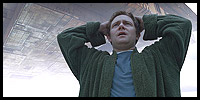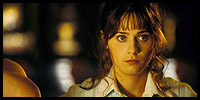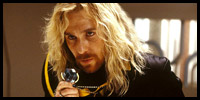
 |
|
The Hitchhiker's Guide to the Galaxy (2005) Cast: Martin Freeman, Zooey Deschanel, Mos Def, Sam Rockwell, Bill Nighy, John Malkovich, Anna Chancellor, Warwick Davis, Kelly MacDonald, Su Eliott, Simon Jones, Jason Schwartzman. Voices: Stephen Fry, Alan Rickman, Helen Mirren, Ian McNeice, Bill Bailey. 2005 – 110 minutes Rated: Reviewed by Dustin Putman, April 30, 2005.  The five-part series of "The Hitchhiker's Guide to the Galaxy," penned by late author Douglas Adams, is known to have many fans and a sizable cult following for sci-fi enthusiasts. This may be the case, and they may get something extra out of this film adaptation, but no genuinely good motion picture requires that the viewer has read the source material. Faithful or not (and some liberties, including a romantic subplot and new supporting characters, have been taken), the movie of "The Hitchhiker's Guide to the Galaxy" is over-bloated, close to plotless, and almost never even remotely funny. Director Garth Jennings, making his major feature debut, is obviously not skilled or technically exciting enough to have been given the job, turning what could have been a potentially rousing ode to Monty Python and Terry Gilliam into a crushing bore and one of the most utterly forgettable moviegoing experiences of the year.
The five-part series of "The Hitchhiker's Guide to the Galaxy," penned by late author Douglas Adams, is known to have many fans and a sizable cult following for sci-fi enthusiasts. This may be the case, and they may get something extra out of this film adaptation, but no genuinely good motion picture requires that the viewer has read the source material. Faithful or not (and some liberties, including a romantic subplot and new supporting characters, have been taken), the movie of "The Hitchhiker's Guide to the Galaxy" is over-bloated, close to plotless, and almost never even remotely funny. Director Garth Jennings, making his major feature debut, is obviously not skilled or technically exciting enough to have been given the job, turning what could have been a potentially rousing ode to Monty Python and Terry Gilliam into a crushing bore and one of the most utterly forgettable moviegoing experiences of the year.
 Nice guy Arthur Dent (Martin Freeman) has not been having a good day. Immediately following the discovery that his home in England is about to be bulldozed, his good friend, Ford Prefect (Mos Def), reveals that he is from another planet. Worse yet, Earth is about to be obliterated by a slimy, ugly alien race known as the Vogons, who are making way for an intergalactic bypass route. Arthur and super-charming and intelligent scientist Trillian (Zooey Deschanel), whom once shared a connection with each other at a costume party, reunite in space, where they have become the only two human survivors. With the help of Ford, Galaxy President Zaphod Beeblebrox (Sam Rockwell) and moody robot Marvin (voiced by Alan Rickman), Arthur and Trillian are taken on a whirlwind guide of the galaxy in their quest to discover the meaning of life and the universe and, finally, set things right for mankind.
Nice guy Arthur Dent (Martin Freeman) has not been having a good day. Immediately following the discovery that his home in England is about to be bulldozed, his good friend, Ford Prefect (Mos Def), reveals that he is from another planet. Worse yet, Earth is about to be obliterated by a slimy, ugly alien race known as the Vogons, who are making way for an intergalactic bypass route. Arthur and super-charming and intelligent scientist Trillian (Zooey Deschanel), whom once shared a connection with each other at a costume party, reunite in space, where they have become the only two human survivors. With the help of Ford, Galaxy President Zaphod Beeblebrox (Sam Rockwell) and moody robot Marvin (voiced by Alan Rickman), Arthur and Trillian are taken on a whirlwind guide of the galaxy in their quest to discover the meaning of life and the universe and, finally, set things right for mankind.
 "The Hitchhiker's Guide to the Galaxy" has an okay first act set on Earth, and a cute opening dolphin musical number called "So Long and Thanks for the Fish," but once the planet has been destroyed and the action—a term used very loosely—switches to outer space, it is all downhill from there. One of the most egregious problems with the picture, which is a distaff cross between 1981's "Time Bandits," 1987's "Spaceballs," and 1992's "Mom and Dad Save the World," is its almost total lack of energy and charisma. There is no momentum to any of it; the narrative just sits there, flopping around like a gasping fish out of water, and the characters are so undernourished and drearily written as to be an afterthought.
"The Hitchhiker's Guide to the Galaxy" has an okay first act set on Earth, and a cute opening dolphin musical number called "So Long and Thanks for the Fish," but once the planet has been destroyed and the action—a term used very loosely—switches to outer space, it is all downhill from there. One of the most egregious problems with the picture, which is a distaff cross between 1981's "Time Bandits," 1987's "Spaceballs," and 1992's "Mom and Dad Save the World," is its almost total lack of energy and charisma. There is no momentum to any of it; the narrative just sits there, flopping around like a gasping fish out of water, and the characters are so undernourished and drearily written as to be an afterthought.
 The romance between Arthur and Trillian, which reveals promise in their first scene together at the costume party, is quickly relegated to the back burner and then forgotten about until the woefully flat and anticlimactic finale. And, for what is clearly intended to be a jokey and dry British-style sci-fi comedy, there is a nagging dearth of charm. Sure, the viewer can tell when something is supposed to be humorous, but it by and large is not—even at a sold-out screening, the audience laugh-factor could be considered respectfully restrained, at best. Only the already-mentioned first couple of scenes and an interlude that depicts a just-existentialized whale falling to Earth and ruminating on life as he unknowingly is about to meet a nasty end could be considered successful. Likewise, there is fleeting hope that opinionated, depressed robot Marvin will come into his own and steal the film, but he never comes close to recognizing his capabilities.
The romance between Arthur and Trillian, which reveals promise in their first scene together at the costume party, is quickly relegated to the back burner and then forgotten about until the woefully flat and anticlimactic finale. And, for what is clearly intended to be a jokey and dry British-style sci-fi comedy, there is a nagging dearth of charm. Sure, the viewer can tell when something is supposed to be humorous, but it by and large is not—even at a sold-out screening, the audience laugh-factor could be considered respectfully restrained, at best. Only the already-mentioned first couple of scenes and an interlude that depicts a just-existentialized whale falling to Earth and ruminating on life as he unknowingly is about to meet a nasty end could be considered successful. Likewise, there is fleeting hope that opinionated, depressed robot Marvin will come into his own and steal the film, but he never comes close to recognizing his capabilities.
 Some of the actors and the occasional computer-generated visuals do their part to breathe life into an inert misfire, but to no avail. Martin Freeman (2004's "Shaun of the Dead") and the joyfully intuitive Zooey Deschanel (2003's "Elf") are the only actors worth positively mentioning. They, too, are left stranded with nothing of consequence to do as sole human characters Arthur and Trillian, and Deschanel is too smart to be wasting her time in such a thankless role, but they are well-cast and likable, nonetheless. As for the work of Sam Rockwell (2003's "Matchstick Men"), Mos Def (2004's "The Woodsman"), and John Malkovich (2003's "Johnny English"), their impact is null and void; thinking back on the film, they made such little impression that they hardly seem to have been there at all. In contrast, the mere narration by Stephen Fry (2001's "Gosford Park"), who sporadically reads from the mystical, wise title guide, is appropriately acerbic and much more a character within the story.
Some of the actors and the occasional computer-generated visuals do their part to breathe life into an inert misfire, but to no avail. Martin Freeman (2004's "Shaun of the Dead") and the joyfully intuitive Zooey Deschanel (2003's "Elf") are the only actors worth positively mentioning. They, too, are left stranded with nothing of consequence to do as sole human characters Arthur and Trillian, and Deschanel is too smart to be wasting her time in such a thankless role, but they are well-cast and likable, nonetheless. As for the work of Sam Rockwell (2003's "Matchstick Men"), Mos Def (2004's "The Woodsman"), and John Malkovich (2003's "Johnny English"), their impact is null and void; thinking back on the film, they made such little impression that they hardly seem to have been there at all. In contrast, the mere narration by Stephen Fry (2001's "Gosford Park"), who sporadically reads from the mystical, wise title guide, is appropriately acerbic and much more a character within the story.
 "The Hitchhiker's Guide to the Galaxy" can be followed and understood by just about anyone, but something tells me only the faithful readers of Douglas Adams' novels will get anything out of this limiting screen adaptation. For everyone else, this is close to valueless. The uninspired direction by Garth Jennings, intermixed with the patience-testing pacing and ill-fated comedy, ensure that the end result is one that should wisely be forgotten about. One would think that all of the talk about the meaning of life would lead to something, whether it be a major revelation or just a punchline, but the movie is too uninterested in itself to even bother coming up with a satisfactory ending. A lot of money was wasted in bringing "The Hitchhiker's Guide to the Galaxy" to the big screen, far too much for something so blindingly trivial and curiously emotionless. Hitching a ride, even one in space, has never been less exciting and adventurous.
"The Hitchhiker's Guide to the Galaxy" can be followed and understood by just about anyone, but something tells me only the faithful readers of Douglas Adams' novels will get anything out of this limiting screen adaptation. For everyone else, this is close to valueless. The uninspired direction by Garth Jennings, intermixed with the patience-testing pacing and ill-fated comedy, ensure that the end result is one that should wisely be forgotten about. One would think that all of the talk about the meaning of life would lead to something, whether it be a major revelation or just a punchline, but the movie is too uninterested in itself to even bother coming up with a satisfactory ending. A lot of money was wasted in bringing "The Hitchhiker's Guide to the Galaxy" to the big screen, far too much for something so blindingly trivial and curiously emotionless. Hitching a ride, even one in space, has never been less exciting and adventurous.
|
© 2008 by Dustin Putman |














